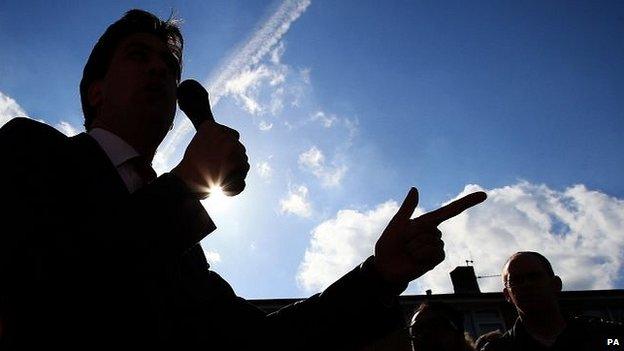Does Labour have an 'Ed Miliband problem'?
- Published

Speak to Labour activists in private, and it is rarely long before some will refer in one way or another to what one described to me as "the Ed Miliband problem".
His critics within the party articulate the concerns expressed by some voters in opinion polls and focus groups: that he doesn't appear sufficiently 'prime ministerial', and he hasn't set out a clear enough vision.
In short, they wonder if he's up to it.
But there are three reasons why most of those with concerns express them privately, rather than publicly.
There is next to no appetite for a change of leader before the election, there is no obvious successor, and Labour could win.
Most opinion polls suggest they will - although two this week have suggested a narrow lead for the Conservatives.
At the weekend, the former Deputy Prime Minister Lord Prescott said publicly what many mutter privately: time is running out and the Conservatives are boxing clever.

Former deputy PM Lord Prescott said the Labour leadership were "too timid"
In response, Ed Miliband uttered a line used before by a party leader facing a gust of internal turbulence: after more than four years as Leader of the Opposition, he was used to receiving advice, not all of it solicited.
But he took on directly and passionately Lord Prescott's claim that his election pitch amounted to merely pursuing core Labour voters and disaffected Liberal Democrat supporters: what political types call a "core vote strategy".
"If anyone believes that the NHS is a minority issue in British politics, they are dead wrong. The NHS is a massive issue for people right across our country," Mr Miliband said.
It is a message we are likely to hear again and again, in an election campaign that appears unprecedented.
"I've never known an election like it," one veteran MP, who has been in the Commons since the 1970s, told me.
With every passing week a close race looks like it is getting closer - with a growing number of variables making it harder and harder to guess what might happen.
'Jitters'
What will the rise of UKIP do to the Conservative vote? And to Labour and the Liberal Democrats?
Will the spike in popularity for the SNP in Scotland be sustained until the election - and will that rob Labour of seats crucial for Ed Miliband?
Will the Lib Dems face annihilation? And if so, where?
Can the Conservatives win more seats than they have now - something not done by a governing party since the 1950s?
Can Labour win when their leader and their economic policies are apparently liked less than those of the Conservatives?
Your guess is as good as mine. Little wonder there are a few jitters around. Plenty in all the parties will have a few between now and May.